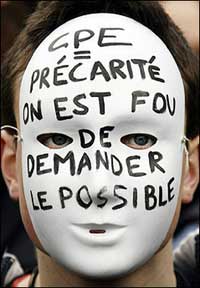PARIS - More than 1 million people poured into the streets across France and
strikers disrupted air, rail and bus travel Tuesday ! even shutting down the
Eiffel Tower ! in the largest nationwide protest over a youth labor law.
Scattered violence erupted in Paris, and riot police used water cannons and
tear gas to disperse several thousand youths who pelted them with stones and
bottles after an otherwise peaceful march. More than 240 people were arrested.

A person demonstrates in Strasbourg, during a
protest against the government's contested First Employment Contract
(CPE). [AFP] |
Unions and the leftist opposition
joined in solidarity with the angry students for the one-day strike, increasing
the pressure on Prime Minister Dominique de Villepin to withdraw the measure
that makes it easier to fire young workers.
Although Villepin held firm, cracks opened in his conservative government.
Interior Minister Nicolas Sarkozy, in a clear break with Villepin, suggested
suspending the law to allow for negotiations.
With the government in crisis, President Jacques Chirac canceled a trip
planned for later in the week to stay in Paris.
Police and organizers' estimates for the number of marchers varied greatly,
but both showed that the protest movement is growing in strength.
Police said 1,055,000 people took part in more than 250 protests nationwide,
including 92,000 in Paris. The organizers' total was closer to 3 million, with
700,000 at the march from the Left Bank to the heavily policed Place de
Republique.
Elsewhere, 31,000 marched in the southwestern city of Bordeaux, 28,000 in the
southern port of Marseille, 26,000 in the Alpine city of Grenoble, 17,000 in
Lyon and hundreds of thousands in dozens of other cities and towns, according to
police.
Riot police, under orders to arrest as many troublemakers as possible, moved
aggressively in Paris to prevent a repeat of the intense violence of past
demonstrations.
Marchers ranged across all age groups, from students with "Non" painted on
their faces, to older union militants. Many said they wanted to defend the
status quo.
"Young people are sacrificed in the name of the economy, and we are here to
fight against it," said Maxime Ourly, 18, a literature student at the Paris
march. "We don't know what will happen in the future, and we want to control our
futures."
Students and labor unions say the labor law will erode France's cherished
workplace protections. Set to take effect next month, it would let companies
fire employees under 26 without reason in the first two years on the job.
Villepin told parliament that he was open to talks on employment and possible
changes to the law but did not say that he would withdraw it.
"Only in action will we convince all of the French that tomorrow can be
better than today," he said, loudly heckled by opposition politicians.
Villepin says the greater flexibility will encourage companies to hire young
workers, who face a 22 percent unemployment rate ! the highest in Western
Europe. But as protests have grown, his government ! and his chances of running
for president next year ! have appeared increasingly fragile.
Sarkozy, who also wants to be the conservative camp's presidential candidate,
told lawmakers from the ruling party that the labor law should not go into
force, so that talks to resolve the crisis can take place, his aides said.
Villepin's sputtering effort at reform underscores the dilemma facing many
European countries that have expensive job protections and social safety nets
under threat by competition from Asian economies with cheaper, less-protected
workers.
The nationwide strike ! the first time that unions had ordered walkouts in
solidarity with students spearheading the protests ! slowed train, plane, subway
and bus services to a fraction of their normal levels.
The Eiffel Tower was closed, its employees said. Some elementary and high
schools also were shut as teachers walked off the job.
National newspapers were not on sale at newsstands, and radio and television
broadcasts were limited.
The State Department advised Americans in France to avoid areas where crowds
were expected to gather and to exercise caution, particularly at night.
"We are here for our children. We are very worried about what will happen to
them," said Philippe Decrulle, an Air France flight attendant at the Paris
protest. "My son is 23, and he has no job. That is normal in France."